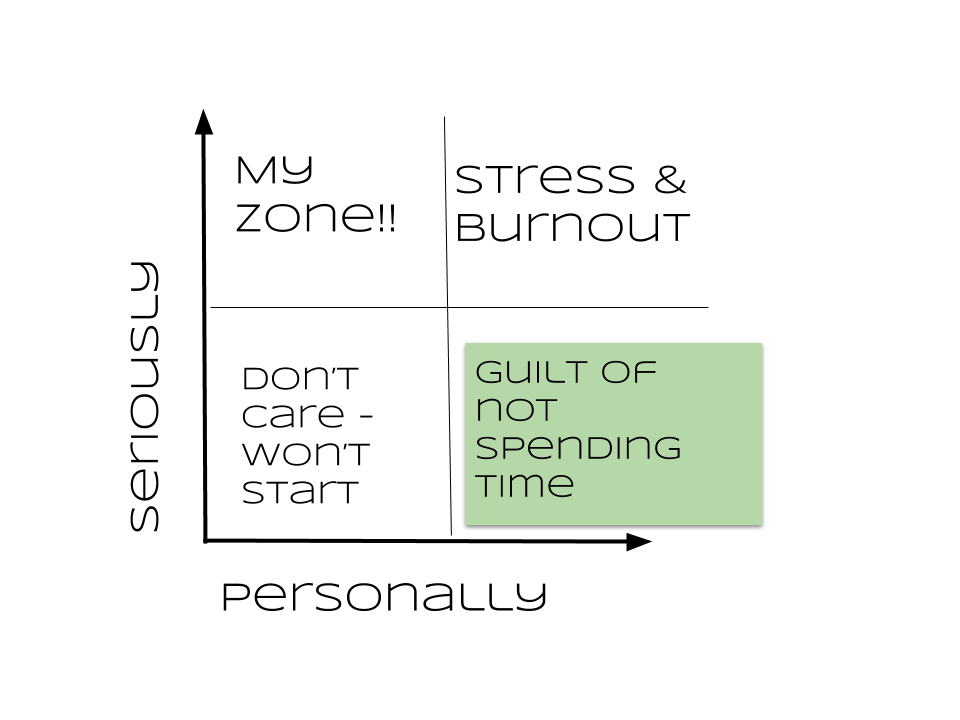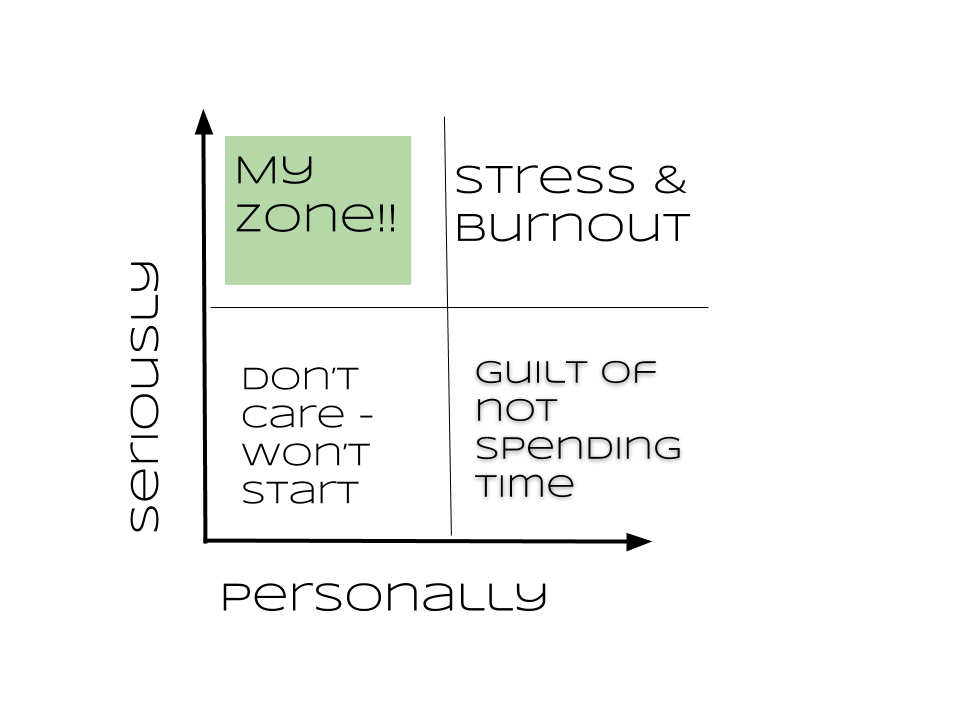Taking Work Seriously, Not Personally

Sometimes I think that there’s nothing good about getting older. Workouts take just a bit more time to recover from, life’s responsibilities multiply, and you’re quickly on the wrong side of ageism in the workplace. There’s one great thing about all those years on earth though – wisdom.
I’ve been pretty damn lucky in my career. Great mentors, smart as hell co-workers, and exposure to the lessons of both corporate disasters and rocket ship growth early on in my career (both are equally meaningful to learning). One thing I’ve also experienced is burnout. If you’ve been there, you know how awful it is both personally and professionally. If you haven’t been there, consider avoiding it 🙂
Burnout did teach me a valuable lesson though – I do my best work when I take it seriously, but not personally. The way I see it, it’s about finding your place on the spectrum of being engaged and being emotional. I have to be engaged (serious) to do well, but if I’m also taking work too personally (emotionally) I’ll struggle to sustain productivity and sanity.
The Urge to Make it Personal
That’s what makes it too personal. Not the hours, but the fact that you’re “living” your work even when you’re not working.
There are two reasons I made work overly personal in the past, both to my detriment.
- The feeling that my work defines who I am as a person.
- The belief that only those who live their work succeed.
The first reason is somewhat driven by societal pressures, but it’s also a reflection of how I viewed the world (and still do to some extent unfortunately). What do you see when you envision of a “successful” person? If it’s a job title, wealth, or anything else tied to someone’s profession you’ll know what I mean. If you don’t think that way, then you’re not only in the minority (especially in Tech), but also likely a happier person in general.
The second reason is somewhat related to the first, but in time I’ve been able to see it as a distinct thing. Even if you’ve moved past defining a person by their work, it’s still easy to fall into the trap of believing that only those who live their work 24/7 will come out on top. Don’t believe me? Follow a bunch of VCs or “serial entrepreneurs” on Twitter. Read popular books on successful tech companies in which the founders are 100% focused the success of their venture at any cost. How could there be another way to succeed?
There’s a key distinction between the second reason and working crazy hours. I wasn’t working crazy hours because I knew I was more productive if I moderated my time at work. It was my belief that even when I wasn’t putting in those hours, I still had to hold my work at the top of my mind – it was a part of me. That’s what makes it too personal. Not the hours, but the fact that you’re “living” your work even when you’re not working.
The Problem with Making it Personal
Every argument about a project, every political battle felt like a personal attack and quite frankly pissed me off.
If there’s one guarantee in your professional life, it’s that you’ll fail to some extent at some point. It may be dramatic. Your company fails or you get fired out of the blue. More likely you’ll clash with peers and executives or take on a project that’s delivered late and underwhelms.
Of course you’ll succeed as well! It may seem like a good idea to make your professional successes personal ones, and to some extent it’s just fine. But left unchecked, you’re back in the trap of tying personal worth to professional endeavors. Both success and failure at work are certainly part of who you are, but only one part.
The more personal I made work in the past, the more stressed I became. Every argument about a project, every political battle felt like a personal attack and quite frankly pissed me off. The thing was, these weren’t personal attacks and I was wasting energy that would have been better spent on solving the problem. Coming to terms with my misdirected anger and stress was a big step, but not a solution.
The Disengagement Trap

Upon realizing that my stress was building in what felt like an irrational way, my first inclination was to disengage a few notches. In other words, take my work a little less seriously. Oh boy, was that a mistake! Back to my chart, that decision put me in the bottom-right quadrant, or “Guilt of not spending time”. In other words in my gut I still felt personally overly-invested in the work, but by taking it less seriously I was causing myself guilt for not immersing all aspects of myself into it.
I recall falling behind on project, feeling immense guilt and painfully catching up. If I hadn’t caught up, I imagine I would have been back in a dispute with peers about lack of progress which would have felt personal – and due to my lack of engagement, perhaps the personal feeling would have been warranted that time around.
Unfortunately, I made the same mistake a few more times before I caught on. I’d overcompensate for the lack of engagement, move the project to success but at the cost of emotional anguish. After all, I was still incredibly invested personally and once I sprinted to get caught up I felt a sense of personal pride followed by emotional exhaustion. “What was it all for?”, I’d ask myself.
Stay Engaged, but Depersonalize

If not taking my work so seriously wasn’t the answer, then what about depersonalizing it to some extent? That’s the top-left quadrant in my chart and for me, my ideal zone. I’ll admit that I stumbled into such a zone, but once I realized it I experimented more purposefully and found a good deal of success.
Does it work all the time? Nope, I still struggle with the right balance. It’s also easier for some work than others. The more closely the work is tied to a personal interest or expertise, the harder it is to set the proper boundaries. It’s not about totally depersonalizing, it’s about dialing it back to a healthy level.
Thankfully, succeeding 100% of the time isn’t my goal. Having a framework to refer back to when I start to feel that pang of stress and personal attacks is invaluable. It’s that getting older thing. Once you’ve experienced a few rounds of pain, you start to see the early signs. Take advantage and adjust course sooner rather than later.
Don’t Lose Pride in Your Work
Depersonalizing work doesn’t mean not taking personal pride in your work. If you’re like me, you spend a great deal of your time working and you should be proud of the result! The trick for me is finding the right balance.
Here’s a good test. Am I proud of my blog posts? For the most part I am. Should I take it personally when I get criticism, even if it’s constructive and coming from someone I admire? No. I should take it as valuable advice that I can use to improve my writing and in turn crank out better posts. Hitting that sweet spot means I’m doing my best work.
